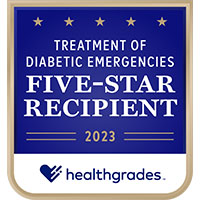All Emergency Room Services
Whether it’s a broken bone, high fever or a more severe medical emergency like a heart attack, we are ready to pro...
Find out what constitutes a medical emergency and when you should visit an emergency room or ER.
Come to our hospital knowing that we do everything possible to keep patients and staff safe.
Saint Vincent Hospital provides helpful emergency health articles and tips to keep you in the know on trending topics, c...
Nine Common Signs of Appendicitis
Appendicitis is the medical term for an infection or inflammation in your appendix. According to the National Institute of Diabetes and Digestive and Kidney Diseases (NIDDK), appendicitis is the most common cause of acute abdominal pain requiring surgery in the United States. Appendicitis may occur at any age, but is more likely to develop in teens and adults in their twenties.
Types of Appendicitis
There are two types of appendicitis:
1. Acute appendicitis
With this type of appendicitis, the symptoms are usually more severe and they develop all of a sudden.
2. Chronic appendicitis
Chronic cases usually have milder symptoms which may come and go from a few weeks to several years.
Causes of Appendicitis
This serious condition can be caused by one or a combination of the following:
- a blockage in the appendix
- an enlarged tissue in the wall of your appendix
- an inflammatory bowel disease
- abdominal trauma
- growths, parasites or stool that can clog the inner part of your appendix
Appendicitis requires immediate medical attention. If you don’t seek immediate treatment, your appendix may burst and spread bacteria or infection into your abdomen, which may lead to more health risks and complications.
Signs of Appendicitis
The signs of appendicitis may vary for each person. But the most common signs include:
- Abdominal pain
- Abdominal swelling
- Constipation
- Diarrhea
- Inability to pass gas
- Loss of Appetite
- Mild fever
- Nausea
- Vomiting
Diagnosis
Doctors usually ask specific questions about the patient’s medical history and symptoms when diagnosing appendicitis. You may also need lab tests, a physical exam, MRI, ultrasound, x-ray or a CT scan.
Treatment Options
Some mild cases of appendicitis may be treated with antibiotics. But usually, if you have appendicitis, your doctor may recommend the immediate removal of your appendix through a surgery to reduce the risk of rupture. The surgeon may perform a:
Laparoscopic surgery
This minimally invasive procedure uses smaller incisions to remove your appendix. Laparoscopic surgery usually leads to shorter hospital stays, faster recovery times and less complications. Your physician may recommend that you limit physical activity for three to five days after the surgery.
Laparotomy
In this type of open surgical procedure, the surgeon removes the appendix through a single incision in the lower part of the abdomen. You may be advised to limit physical activity for 10 to 14 days after the surgery.
Final Thoughts
The appendix can rupture within 48 to 72 hours from the onset of symptoms. So if you are experiencing signs of an appendicitis, please seek care by booking an appointment with a doctor as soon as possible. In case of a ruptured appendix, which is considered a life-threatening emergency, please call 911.
Sources:
National Institute of Diabetes and Digestive and Kidney Diseases
Healthline

 The Emergency Room (ER) at Saint Vincent Hospital provides you with access to nationally renowned experts in emergency medicine, toxicology, cardiac problems, trauma, and more when you need them most. At the Saint Vincent Hospital Emergency Room, you’ll find:
The Emergency Room (ER) at Saint Vincent Hospital provides you with access to nationally renowned experts in emergency medicine, toxicology, cardiac problems, trauma, and more when you need them most. At the Saint Vincent Hospital Emergency Room, you’ll find: